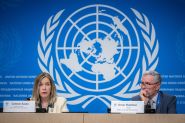- Home
- Middle East
- Climate Change: “The Wasted Time Has Been Paid in Lives”

Branding for the COP29 climate conference adorns the exterior of a building undergoing renovations in Baku, the capital of Azerbaijan, which will host the event from November 11 to 22, 2024. ©Tofik Babayev / AFP
Published on October 29, the 2024 Lancet Countdown report warns of the increasing dangers of climate warming on global public health. This situation is worsening over the years and exacerbating inequalities, leading to an alarming rise in deaths and health issues. Experts are issuing an urgent call for immediate global action.
The 2024 Lancet Countdown report on health and climate change reveals that global warming poses an increasingly significant threat to public health. Compiled annually by researchers from various universities and UN agencies, the study highlights the multiple dangers facing the global population. “Data in this year’s report show that people all around the world are facing record-breaking threats to their wellbeing, health, and survival from the rapidly changing climate,” the study asserts. The authors emphasize that climate change is not merely a long-term concern; it has already become a significant challenge, contributing to a rising number of health issues, some of which are lethal.
Alarming Human Costs
Published by Elsevier, one of the largest scientific editors, this fifty-page report demonstrates that rising global temperatures have more serious and immediate health impacts than previously anticipated. Heatwaves are becoming more frequent and intense worldwide, especially in temperate regions that were not previously prepared for such extreme temperatures. Despite the hopes raised by the Paris Agreement in 2015, the world risks exceeding the +1.5 °C warming threshold. In 2023, the average annual temperature reached a record level of 1.45 °C above pre-industrial levels, and from February 2023 to January 2024, it was even 1.52 °C higher than during the 1850-1900 period, according to the European Copernicus Institute.
The study, signed by 122 experts, reports an alarming rise in heat-related deaths among people aged over 65. These fatalities reached unprecedented levels in 2023, showing a 167% increase compared to the 1990s. In addition to this grim record, the report also discusses various issues such as sleep disturbances (with a 6% reduction in sleep hours compared to the average observed between 1986 and 2005), heat-related illnesses from outdoor activities, and worsening chronic conditions. All these factors exacerbate health inequalities between exposed regions and those with more temperate climates, presenting challenges that require immediate and appropriate responses.
Extreme Weather Events
Along with rising temperatures, the Lancet Countdown points out that extreme weather events are happening more often and becoming more severe, which directly affects people’s health and infrastructure. Between the periods of 1961-1990 and 2014-2023, 61% of the global land area experienced an increase in the number of days with extreme precipitation events. By causing floods and contaminating drinking water sources, these events exacerbate the risk of waterborne infectious disease outbreaks.
Simultaneously, 48% of the global land area experienced at least one month of extreme drought in 2023, worsening poverty and malnutrition in affected countries, particularly in Africa. The economic consequences are equally concerning. Annual losses attributed to extreme weather events increased by 23% between 2010-2014 and 2019-2023, reaching $227 billion. In countries with low human development indices, the vast majority of these losses were not covered by insurance, compelling local communities to endure the full impact of the damages.
Insufficient Efforts
Experts stress the necessity of adopting a holistic approach to these risks. “Multiple hazards revealed by individual indicators are likely to have simultaneous compounding and cascading impacts (...) threatening people’s health and survival with every fraction of a degree of increase in global mean temperature,” the report states. This systemic perspective on the issue underscores the complexity of situations where various factors—such as heat, drought, and precipitations—interact, resulting in public health crises that are challenging to manage.
Furthermore, the publication indicates that efforts to adapt to climate change are predominantly inadequate. In 2023, global CO2 emissions from energy reached an all-time high. Oil and gas companies persist in expanding their projects despite commitments to an energy transition. By March 2024, the 114 largest firms in the sector were on track to exceed emissions deemed compatible with established targets by 189%, compared to 173% the previous year. This escalating reliance on fossil fuels, driven by profits from the global energy crisis, significantly undermines the framework established by the Paris Agreement on climate change.
“If action is not taken today, the future will be very dangerous," researcher Marina Romanello, who coordinated the report, told AFP. "There is really no more time to waste. I know we have been saying this for many years, but what we are seeing is that the wasted time has been paid in lives.”
Urgent Adaptation Needed
To mitigate the impacts of climate change on health and the environment, the report calls for the immediate implementation of adaptation strategies. Managing wildfires, preventing flooding, and improving health infrastructure are examples of measures that can reduce immediate risks. Additionally, urban development that incorporates green spaces and architecture suited for extreme temperatures could lower mortality during heatwaves. The World Health Organization (WHO) and the United Nations also urge for international mobilization to strengthen the resilience of health systems, especially in the most vulnerable regions.
Given the escalating and destructive impacts of climate change, it is essential to reassess energy policies, implement pragmatic support for prevention and adaptation initiatives, and, most importantly, cultivate a collective awareness of the global threats facing the world.
Read more




Comments